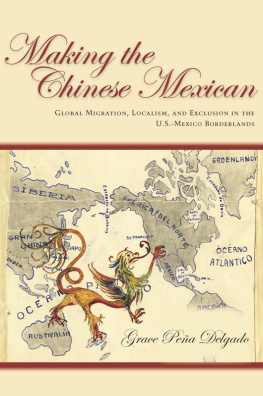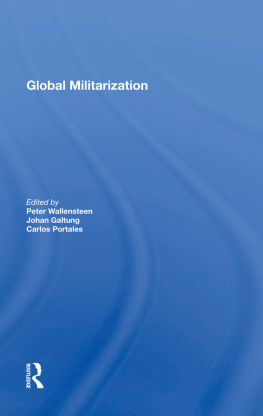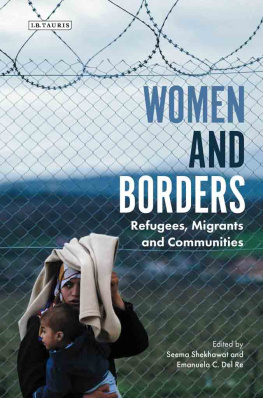WALLS OF INDIFFERENCE
WALLS OF INDIFFERENCE
IMMIGRATION AND THE MILITARIZATION
OF THE US-MEXICO BORDER
NICOLE I. TORRES
First published 2015 by Paradigm Publishers
Published 2016 by Routledge
2 Park Square, Milton Park, Abingdon, Oxon OX14 4RN
711 Third Avenue, New York, NY 10017, USA
Routledge is an imprint of the Taylor & Francis Group, an informa business
Copyright 2015, Taylor & Francis.
All rights reserved. No part of this book may be reprinted or reproduced or utilised in any form or by any electronic, mechanical, or other means, now known or hereafter invented, including photocopying and recording, or in any information storage or retrieval system, without permission in writing from the publishers.
Notice:
Product or corporate names may be trademarks or registered trademarks, and are used only for identification and explanation without intent to infringe.
Library of Congress Cataloging-in-Publication Data
Torres, Nicole I., author.
Walls of indifference : immigration and the militarization of the US-Mexico border / Nicole I. Torres.
pages cm
Includes bibliographical references and index.
ISBN 978-1-61205-748-4 (hardcover : alk. paper)
ISBN 978-1-315-63124-0 (ebook)
1. ArizonaEmigration and immigration. 2. BorderlandsArizona. 3. Border securitySocial aspectsArizona. 4. Illegal aliensArizonaSocial conditions. 5. Social conflictArizona. I. Title.
JV6912.T67 2014
325.73dc23
2014019482
ISBN 13: 978-1-61205-748-4 (hbk)
ISBN 13: 978-1-61205-749-1 (pbk)
To Mom, Randy, Nana, and the Romeros.
The Arch of Heaven
In the Name of the Son of Light,
The Son of Maria,
Foster Son of Brighd in Avalon,
Keystone of the Arch of Heaven,
He Who Joins as One,
The Forks Upholding the Sky.
His the Right Hand,
His the Left Hand,
His the Rainbow Letters,
All in Rich Fermented Milk.
We Will Go in His Name,
In All Shapes of Shapes,
In All Colors of Colors,
Upon the Path to Peace.
It is the Son of Light,
The Son of Maria, Saying
Ask in My Name and Peace Shall be Given Unto You,
Enter in My Name and Ye Shall in No Wise be Cast Out.
Do You See Us Here,
Oh, Son of Light?
Says the Son of Light,
I See!
R. J. Stewart 1985 reproduced with the authors permission
This book is based on participation in numerous situations and conversations. It is also based on more than one hundred interviews that I conducted over the course of two and a half years. I have changed names and identifying features. In order to preserve confidentiality, some of the descriptions of individuals contain elements taken from more than one person or situation. I use generic terms such as social worker and officer in a further effort to preserve anonymity.
I would like to thank the following people and organizations for their support and assistance in preparing this book. I extend a very special thanks to my doctoral committee. My chair, Lorna Rhodes, supported my commitment to this project from beginning to end and gave me much needed mentoring and coaching. Daniel Hoffman and Miriam Kahn provided encouragement and exceptional feedback during my entire doctoral program, for which I am grateful. I owe a special thanks to Jason De Len who introduced me to his Migrant Material Culture Project. His project illuminated my own fieldwork and strengthened my ethnographic analysis. I extend a hearty thanks to Devon Pea, Maria Elena Garcia, Eugene Aisenburg, and Juan Guerra. I am ever grateful for their support and guidance at various points in my doctoral research. I also thank the many others who have supported me, challenged me, and encouraged me during my doctoral program.
To the residents of Phoenix and Tucson who were gracious enough to tell me your stories, I express my deep gratitude. Thank you for your patience and for your willingness to share experiences that were undoubtedly painful. Although I cannot name you here, please know that I am deeply indebted to you and admire your dedication.
I would have not been able to complete this research without the financial support of the Graduate Office of Minority Affairs Program, the Stroum/Bank of America Dissertation Writing Fellowship, and the University of Washingtons Anthropology Department.
Thanks to Cade, Andy, Sam, and Moss for your feedback and willingness to listen to my stories about fieldwork. I extend a special thanks to the Pick and family. Mom, Randy, Grandma, Nana, and Dad, this book is the product of your unwavering support from el barriothe hood. My last and best thanks are to my partner, Gary Moore, who has untiringly supported me in this research during the past four years through all the editing, sleepless nights, and countless cups of coffee.
On January 8, 2011, at approximately 10:00 a.m., Arizona congresswoman Gabrielle Giffords was shot during one of her local Meet and Greet events. This occurred in the parking lot of a Safeway supermarket in the Tucson metropolitan area. The shooter, Jared Lee Loughner, injured fourteen bystanders and killed six peopleincluding a local district court judge.
The Tucson shooting, as it is now called, took place during the final days of my dissertation fieldwork in Arizona. At the time it occurred, I was talking with Dan, a friend of mine who ran a local bed and breakfast (B&B). As I stood in his kitchen, I listened to him reflect on the social climate of Arizona, the politics surrounding the US-Mexico border, and immigration. Dan complained that the current political climate around the border and immigration policy did not encourage holistic thinking, something he considered to be vital. According to Dan, the construction of the US-Mexico border creates war and makes it hard to solve problems, to the point where no one is safe.
The dovetailing of Dans comments and the Tucson shooting goes to the very heart of my project: What kinds of environments assemble the conditions that make violence possible? This question emerged from my interest in prison populations; I was curious as to what variables, besides race and class, led to incarceration. Ultimately, this question led me to Arizona. I learned that border politics, public conversations regarding immigration, detention centers, gated communities, and the people themselves encompass multiple topographies. These topographies, as I explain, compose what I call the ecology of militarization.
This ethnography documents and explores the social, political, and material consequences of militarization in the borderlands of Arizona. Based on two years of fieldwork in Phoenix, Tucson, and along the US-Mexico border, I identify militarization as a social and political phenomenon that gradually reconfigures both individuals and communities. What is most striking about the process of militarization is its instrumentalization. Although fieldwork participants use the tropes of immigration and race as central points for discussion, I observed that these discourses point to a much broader trend of social, psychological, and political transformation connected to the proliferation of vigilantism, gated communities, and detention centers. Most recently, this transformation is embodied and articulated through the experiences of














